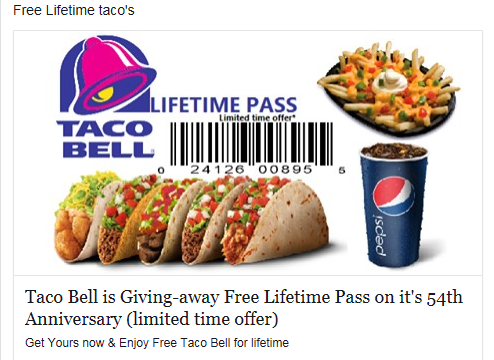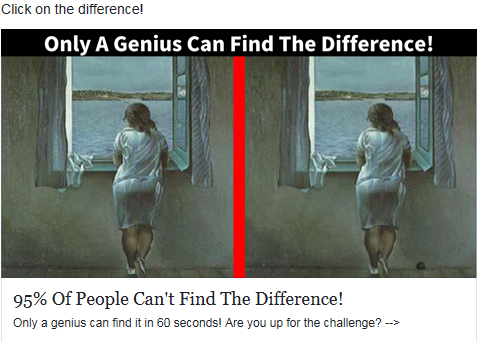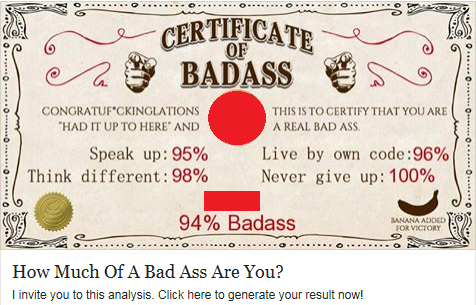ItsGeekToMe.co
The official home of It's Geek to Me on the web!
Issue #500: February 19-25, 2017
“Can you list a state without an A in the name? Bet you can’t!” “Only 1 in 10 people can name these famous faces.” “It’s my birthday. I bet I won’t even get a single Like.” “Would you [wear/drive/buy/eat] this?” “You won’t believe what happens! Click ‘Like’ then ‘Share’.” “We can’t sell these iPads because they’ve been sitting in our warehouse, so we’re giving them away.” “My Daddy said he’d quit smoking if I could get 1000 Likes.” “Would you vote for this candidate? Like=Yes Share=No.” “Can you name a song that has a color in the title?”
Welcome to the world of Facebook in 2017, and welcome to issue number 500 of It’s Geek To Me. After I climbed out from under the pile of confetti and interns from our spectacular 500th Issue office party on the top floor of Geek Tower, I gave my research staff the rest of the week off, dragged myself to my corner office and pondered how I might bring this landmark issue to you, my fellow Geek-Readers. I decided to take a break from answering questions, and indulge myself writing about something that’s been under my skin for quite a while now. Specifically, I want to educate you about some of the irritating, malicious, and borderline criminal activity that goes on right under your nose on Facebook every day, and how you might be contributing to the problem.
Over the past couple of years, I have warned dozens of my friends that something on which they had clicked “Like” was a scam. Almost to a person, the response was something like “I know. But it’s just a ‘Like’. No big deal.” Actually it can be quite a big deal. When you think of things of value online, a Facebook account probably isn’t among the first things that cross your mind; but Facebook places a high value on a page’s popularity, as measured by – you guessed it – the number of Likes and Shares it has. The more popular a page is, the higher the chance is that it will appear in other people’s news feeds. For someone looking for a way to get instant credibility and exposure, a popular page is highly prized. There is a practice known as “Like Farming” in which people use the types of posts that I quoted in this article’s lead-in to bait people into Liking, Sharing or simply commenting on an article. When the page popularity has reached a suitably high level, the like-farmer removes its original content and replaces it with something else, such as scam advertising or even malware. It may be used to collect marketing information, or simply be sold outright to a cybercriminal. Like-farming is especially nefarious because even posting a message in the comments warning people not to click it feeds the page’s ranking, increasing its worth. The only way to not feed it is to refrain from liking it or clicking on it.
There are other Facebook traps that are even worse. These are little applets that do everything from IQ Tests to personality analysis to generating some odd “fact” about you, such as matching your personality to a Disney character, color, classic movie, or other nonsense. While these may be a fun distraction, these apps often require you to grant them access to a whole bunch of your account information that should, by all rights, be kept to yourself, not the least of which is the contents of your friend list. But you do it anyway, and guess what? Now all of your friends can be marketing tools along with you.
So, the next time you see one of these irritating memes, remember that the chances are that picture of the burn victim, child in the hospital, or lonely veteran that’s tugging at your heart strings was probably swiped from the web. Ignoring it, or deciding not to type ‘Amen’ does not actually mean you’re a bad person – it just means you’re streetwise to Facebook scams. Remember that nobody anywhere is ever going to give away anything of value via Facebook just because it was returned, was found in their back room, or has been sitting in their showroom or warehouse for too long. And most of your friends probably don’t want to be constantly asked to clog-up their newsfeeds with requests to Like things, Share things, join things, or repost things that you already posted to prove that they read your post. Chances are that you and most of your friends share the same friends anyway, so if only one of you posts something, it’s likely that you will all see it. That’s the way Facebook news feeds work.
Visit my web page See below for some funny memes that go along with this topic! Better yet, be sure to visit It’s Geek To Me on Facebook, Like our page, type “Amen” and Share it with your friends. Ignore and you’re heartless!
Bonus Web-only Content:
Here are some examples of the types of Facebook posts I mentioned above:
 No, actually, they’re not.
No, actually, they’re not.
 I’m pretty sure God doesn’t have a Facebook account. If you need his intervention, prayer is a much more effective communication tool.
I’m pretty sure God doesn’t have a Facebook account. If you need his intervention, prayer is a much more effective communication tool.
 And that will help you accomplish…nothing. Facebook is not a petition, nor is it a bellwether of voter opinion. If you want term limits, write to your congressman.
And that will help you accomplish…nothing. Facebook is not a petition, nor is it a bellwether of voter opinion. If you want term limits, write to your congressman.

Of course, a REAL genius wouldn’t get duped into clicking on this. Just saying!

Can you name a less lame way to trick someone into clicking your garbage?

Sadly, numerous people will consider this a challenge, and they will “Oh yeah? Well watch this!” their way into clicking on it.

Avoiding Facebook click-traps: 100% – Genuine badass!
Here is one poster’s rather amusing response to this sort of thing. Now this I like:

Until next week – good luck and happy computing!
– Geek
Leave a Reply
You must be logged in to post a comment.